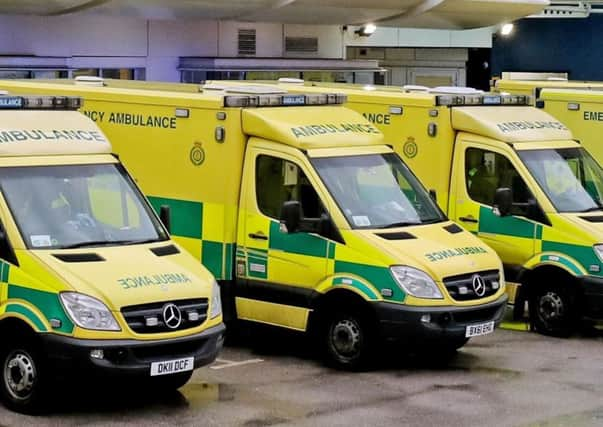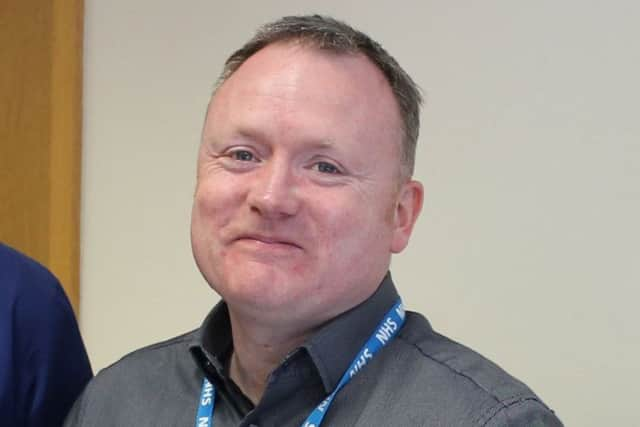South Tyneside hospital facing winter pressures all year round


NHS Providers, the body that represents trusts, says several factors, including A&E waiting times and staff shortages, suggests problems for hospitals in the months ahead.
At South Tyneside NHS Foundation Trust, A&E waiting times are already slightly worse than last year.


Advertisement
Hide AdAdvertisement
Hide AdBetween April and September, 32,300 people attended an emergency department, with 95% being admitted, transferred or discharged within four hours. The government target is 95%.
That figure is lower than the same period in 2017, when 96% of patients were seen within four hours.
Dr Sean Fenwick, Director of Operations at South Tyneside and City Hospitals Sunderland NHS Foundation Trusts said: “Like the rest of the NHS, we continue to see unprecedented demand for our emergency care services.
“This pressure is now all year round and means the NHS is now successfully treating more patients than ever before within four hours.
Advertisement
Hide AdAdvertisement
Hide Ad“Our teams are working exceptionally hard, day-in, day-out, to ensure safe, high quality care for every patient who needs emergency treatment.
“And, despite this relentless increase in activity, we continue to see around nine out of every 10 people within four hours of their arrival, which is testament to the exceptional skill, dedication and commitment of our amazing frontline staff.
“It is vital as part of our Path to Excellence programme that we continue to work together across the whole local health economy to ensure emergency care services are kept free for those with the most serious emergencies, and that we build future services which provide the best possible care and outcomes for the growing number and complexity of patients who need emergency hospital-based care.
“We have robust plans in place to ensure that we can continue to provide patients with high quality care this winter and would urge the public to help us by using the most appropriate service to meet their needs.
Advertisement
Hide AdAdvertisement
Hide Ad“You can now access your GP in the evening and weekends and local pharmacists can help with minor illnesses. If you need urgent health advice, call 111.”
Across England, the percentage of people dealt with within the goverment target dropped by 1% since last year, to 84% in 2018.
NHS Providers believes this indicates the coming winter is likely to put more strain on trusts than the last.
Deputy chief executive Saffron Cordery said: “Trusts and their staff put in extraordinary efforts last year to meet record demand – demand which continues to grow every winter.
Advertisement
Hide AdAdvertisement
Hide Ad“Despite measures to prioritise emergency care, it was clear that in many places the quality of care for patients feels short of what the public rightly expects.
“There are many improvements which have been put in place to welcome but there are clear warning signs.
“Performance is in a worse position going into this winter than last. Staff shortages are growing, putting additional strain on a workforce already overstretched during an exceptionally busy summer.”
The situation is compounded by a number of unfilled roles at South Tyneside NHS Foundation Trust.
Advertisement
Hide AdAdvertisement
Hide AdIn March 2018, the most recent period for which data is available, there were vacancies equivalent to 22 full-time jobs. This was actually fewer than in April 2017, when there 43 open jobs.
Of those, seven were nurses and six were other medical staff.
NHS Digital warned that the number of nurse vacancies was likely to be higher, as the figures show the minimum number of jobs advertised, and many trusts have rolling adverts for nurses.
Donna Kinnair, acting chief executive and general secretary of the Royal College of Nursing, said: “Staff are doing all they can, but demand is outstripping supply and winter 2018 could be the one that brings services to a standstill.
Advertisement
Hide AdAdvertisement
Hide Ad“The signs in the Providers’ report are ominous – increasing demand, worsening A&E performance and a yawning chasm in nurse numbers.
A spokesman for the Department of Health and Social Care said: “We recognise winter can be challenging, but as the report itself notes, the NHS will benefit from a second year of better, enhanced, national level winter planning, as well as £420million to redevelop A&Es, improve emergency care and help get patients home quicker.
“The most recent performance statistics show that despite an increase in demand, hardworking and dedicated staff ensured that nearly 2,000 more patients a day were seen within four hours in September compared to the same month in 2017.”